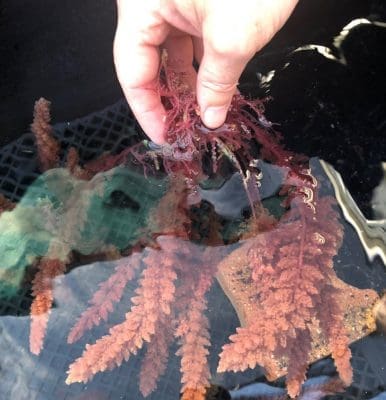LOWERING methane emissions through the use of asparagopsis seaweed as a feed supplement has entered its commercial phase, with first sales of product for use in feedlots this month.
The first commercial sale of asparagopsis feed supplement in Australia by CH4 Global is a significant step forward for the industry. The development comes following the discovery that adding a small amount of asparagopsis seaweed to a ruminant’s existing feed can reduce their methane emissions by more than 80 percent.

Compounds in red asparagopsis seaweed have been found to reduce methane emissions from livestock by at least 80 percent
The importance of this discovery towards the beef industry’s carbon neutrality by 2030 target has resulted in industry stakeholders working hard to make the product available to producers.
FutureFeed was formed in August 2020 to commercialise the technology developed by CSIRO, together with Meat & Livestock Australia and James Cook University. FutureFeed the company, is supported by a group of investors including GrainCorp, Harvest Road; Woolworths; AGP Sustainable Real Assets; Sparklabs and-Cultiv8 Joint Venture.
FutureFeed has issued licenses to seaweed growers which enables supply of asparagopsis to the livestock market. There are currently three licensees in Australia: CH4 Global, Sea Forest and SeaStock (see details below).
Beyond licenses, FutureFeed has been busy establishing the foundations for a successful industry. This includes furthering the foundational science through research, development and trials subjected to rigorous peer-review to further support the discovery. Certification standards and a trademark are under development to ensure the robustness and credibility of the value chain.
In a release issued today, Cassandra Kelly, senior advisor to FutureFeed, said the first commercial sales in Australia completed by CH4 Global this month was “another significant milestone” in the asparagopsis journey.
“It’s both inspiring to reflect on how the industry has managed to engage the brains trust, community and investment support in just under four years to make a product launch like this a reality,” Ms Kelly said.
“Just a few years ago, asparagopsis was a largely unknown seaweed that was not cultivated in commercial quantities and had very few applications outside of niche cosmetics and as a condiment in Hawaii. Now we are seeing a new industry with the capability to support local communities and the creation of jobs whilst working together to make a meaningful impact on methane emissions from livestock.”
CSIRO chief executive Dr Larry Marshall said the first commercial sale of FutureFeed was an exciting turning-point for translating breakthrough science into solutions.
“CSIRO is proud to have been part of the FutureFeed journey, including going through our revolutionary ON program to accelerate the idea from benchtop to business,” Dr Marshall said.
MLA managing director Jason Strong said emissions avoidance was a critical component of the red meat industry achieving carbon neutrality by 2030.
“MLA is continuing to work on a range of tools and technologies for producers to cost-effectively reduce emissions and increase productivity by demonstrating environmental stewardship credentials to customers, consumers and the community,” Mr Strong said.
“We are proud to be working alongside FutureFeed in rolling out asparagopsis to a range of commercial partners. Asparagopsis is one of many exciting tools the industry can embrace in working towards our goal of carbon neutrality at the end of the decade,” Mr Strong said.
FutureFeed has issued licenses to three seaweed harvesting and/or growing companies which enables supply of asparagopsis to the livestock market – CH4 Global, Sea Forest and SeaStock.
- CH4 Global, which has developed a freeze-dried asparagopsis based feed additive product, is now accepting orders for 10,000 head or more. Click here for details: www.ch4global.com
- Sea Forest, which has both oil-based and freeze dried formulations, is accepting orders – www.seaforest.com.au, and
- SeaStock, which has an oil-based product is accepting pre-orders – www.seastock.com.au
Producers should make their own inquiries specific to their circumstances prior to introducing a new supplement.
The first customer to receive CH4 Global’s commercial product is South Australian company CirPro, described as a protein manufacturer and meat processor, for use across its feedlot partners, one of which is HB Rural near Warnertown.
CirpPro, which previously operated as Pirie Meats, announced plans last October to build a multi-million dollar abattoir near Port Pirie. In March this year it made a public appeal for government backing to start the project.
CH4 Global’s methane-reduction objective includes a lofty five-year target of reaching 150 million cattle – ten percent or the world’s population, which would prevent the emission of one gigatonne of CO2 equivalent if achieved.
The company’s plans for 2023 and 2024 are focused on rapid commercial growth in Australia and New Zealand through asparagopsis production by its regional subsidiaries, CH4 Australia and 0CH4 Aotearoa. The company said work was also well underway in North America to develop asparagopsis production capacity there.
For more information on the products available from CH4 Global, Sea Forest and SeaStock, click here.
Source: MLA, FutureFeed

1) So they harvest, dry, grind, pack and then transport seaweed by hand? Or by diesel and coal?
~100 000 head on feed = 5t a day required, and it is 50t a day wet weight to be processed, at <1t/ ha ocean naturally.
2) When asked what he thought the public response to bromoforms in the food chain would be with this product, he answered honestly that the community had decisions to make.
The world has gone mad.
Yep sure has.
As Beef Central reported earlier, commercial companies have recently developed a way to manufacture the active compound found in asparagopsis in the laboratory. Doesn’t that negate the need to harvest seaweed to get it?